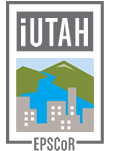 NSF EPSCoR
NSF EPSCoR
The mission of EPSCoR is to assist the National Science Foundation in its statutory function "to strengthen research and education in science and engineering throughout the United States and to avoid undue concentration of such research and education." EPSCoR goals are: a) to provide strategic programs and opportunities for EPSCoR participants that stimulate sustainable improvements in their R&D capacity and competitiveness and b) to advance science and engineering capabilities in EPSCoR jurisdictions for discovery, innovation and overall knowledge-based prosperity. For more information or solicitations visit the NSF EPSCoR site.
The following projects were funded by NSF EPSCoR during Utah’s period of eligibility.
Track 1 Research Infrastructure Improvement Award (RII Track 1)
 Title: iUTAH-innovative Urban Transitions and Aridregion
Title: iUTAH-innovative Urban Transitions and Aridregion
Hydro-sustainability - Awarded August 1, 2012
Award Number: 1270832
Proposal: PDF Document
iUTAH: innovative Urban Transitions and Aridregion Hydro-sustainability will build critical observatory and modeling facilities across watersheds; create transdisciplinary research teams from many Utah institutions, government agencies, and the private sector; and enhance expertise and diversity through strategic recruitment of faculty and students. The novel and transformational activities of iUTAH include: the development of fully integrated hydrologic and social sciences observatories that encompass whole watersheds along an urbanization gradient; collaborative activities to create a community of scholars across the state to address sustainability of coupled human-natural systems; and integrated education and outreach activities such as participatory and collaborative modeling efforts to communicate and collaborate with stakeholders and policy makers.
Track 2 Research Infrastructure Improvement Award (RII Track 2)
 Title: Collaborative Research: CI-WATER, Cyberinfrastructure to Advance High Performance Water Resource Modeling - Awarded September 1, 2011
Title: Collaborative Research: CI-WATER, Cyberinfrastructure to Advance High Performance Water Resource Modeling - Awarded September 1, 2011
Award Number: 1135482
Proposal: PDF Document
An interdisciplinary team of Utah and Wyoming researchers has received a $6 million, three-year award from the National Science Foundation (NSF) to develop a better understanding of the interconnectivity of natural and human water resources systems – a critical environmental sustainability problem facing both Western states.
The award will allow the team of researchers to develop high-performance computer modeling and computational resources (known as cyberinfrastructure or CI for short) to simulate and study how factors such as population growth, shifting land uses and climate variability will impact water storage and availability in the Intermountain West. This award is made under the NSF Established Program to Stimulate Competitive Research (EPSCoR), which supports states' efforts to enhance research, science and mathematics education, and workforce development.
The CI-WATER project includes researchers from Brigham Young University, the University of Utah, Utah State University, and the University of Wyoming. BYU and the University of Wyoming are the lead institutions for their respective states in the consortium.
Inter-Campus and Intra-Campus Cyber Connectivity (RII C2)
Title: Extending Campus Networks and Research@UEN Optical Network in Support of the Utah EPSCoR Initiative - Awarded September 1, 2010
Award Number: 1007027
Proposal: PDF Document
This RII Inter-Campus and Intra-Campus Cyber Connectivity (RII C2) award leverages the facilities and statewide reach of the Utah Education Network (UEN) to expand the capabilities of the of the research and education communities to more effectively engage faculty and students across Utah in science, technology, engineering and mathematics (STEM) fields. The team is extending network capabilities (initially provisioned at an aggregate bandwidth of 30 Gbps) of the Research@UEN optical network to Brigham Young University (BYU) and the University of Utah (UU) to complement capabilities under development for Utah State University (USU) and UU. Research@UEN's Phase-1 development includes the Salt Lake City metropolitan optical network and a fiber-based spur to Logan in support of UU and USU, respectively. The RII C2 project proposes southward extension to Provo for BYU that can enhance the level of collaboration and computational engagement among the three institutions, and greatly expand their capabilities to collaborate with researchers nationally and internationally through high-speed access to the national research and education networks, including the 100-Gbps Internet2 Network and ESnet.
NSF EPSCoR 2030 Report
Title: EPSCoR 2030: A Report to the National Science Foundation
PDF: Report
A panel of nationally recognized scientists and engineers met at the behest of the National Science Foundation (NSF) to examine the Established Program to Stimulate Competitive Research (EPSCoR) in terms of its relevance to the national research agenda. The two-day workshop produced observations about the value of the NSF program and recommended programmatic changes to be made both by NSF and by the EPSCoR states that can enhance EPSCoR’s effectiveness.
